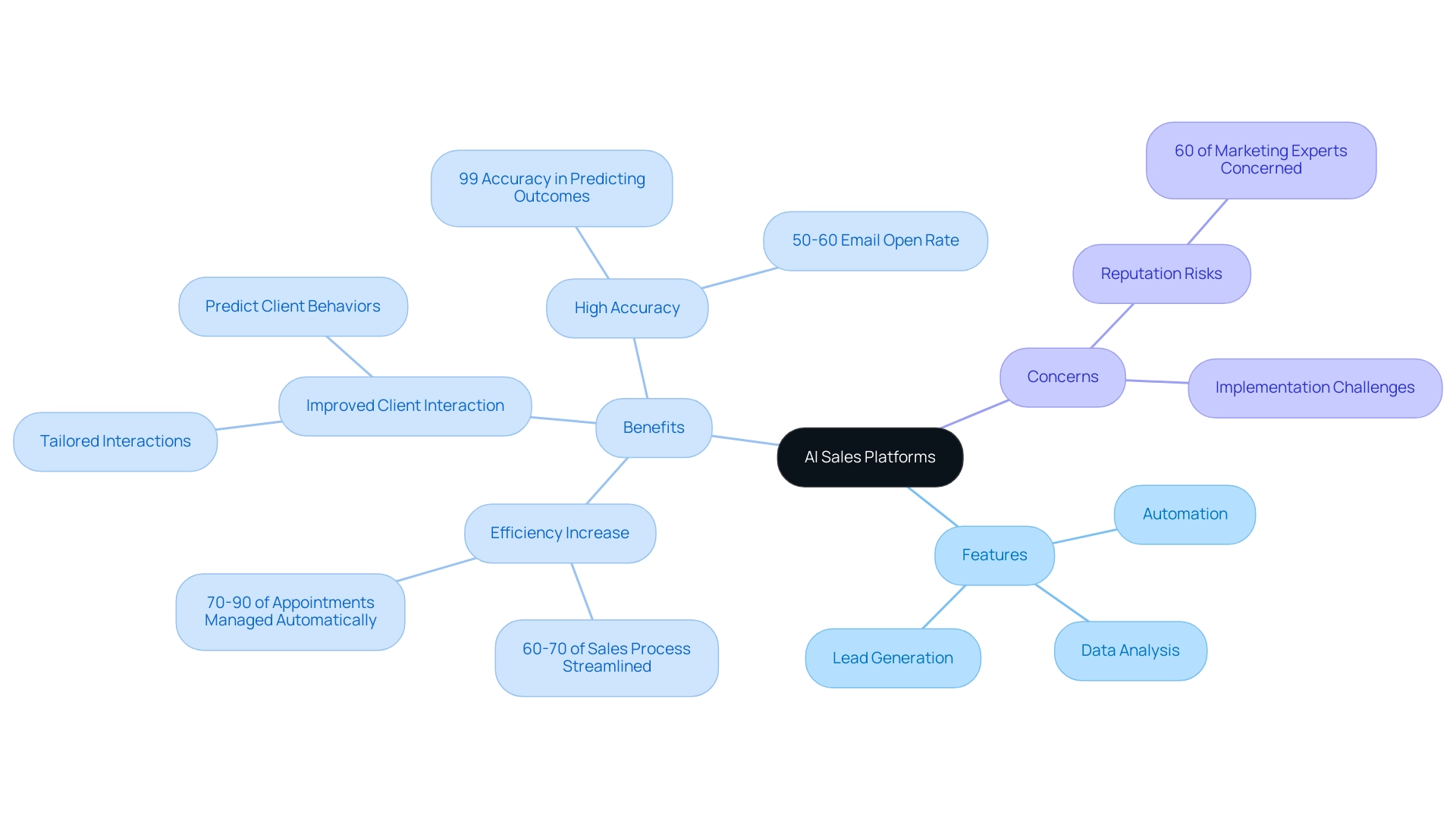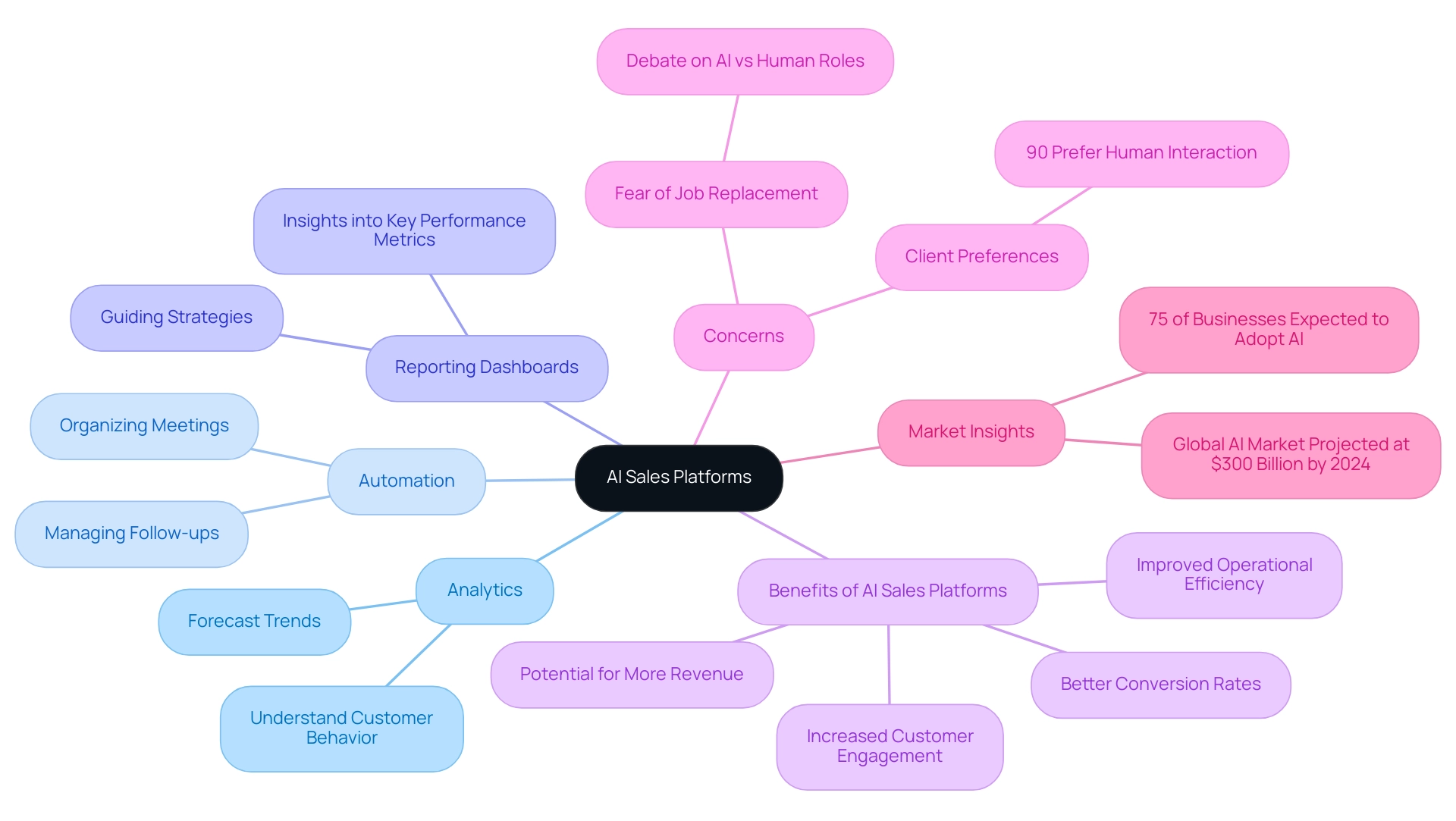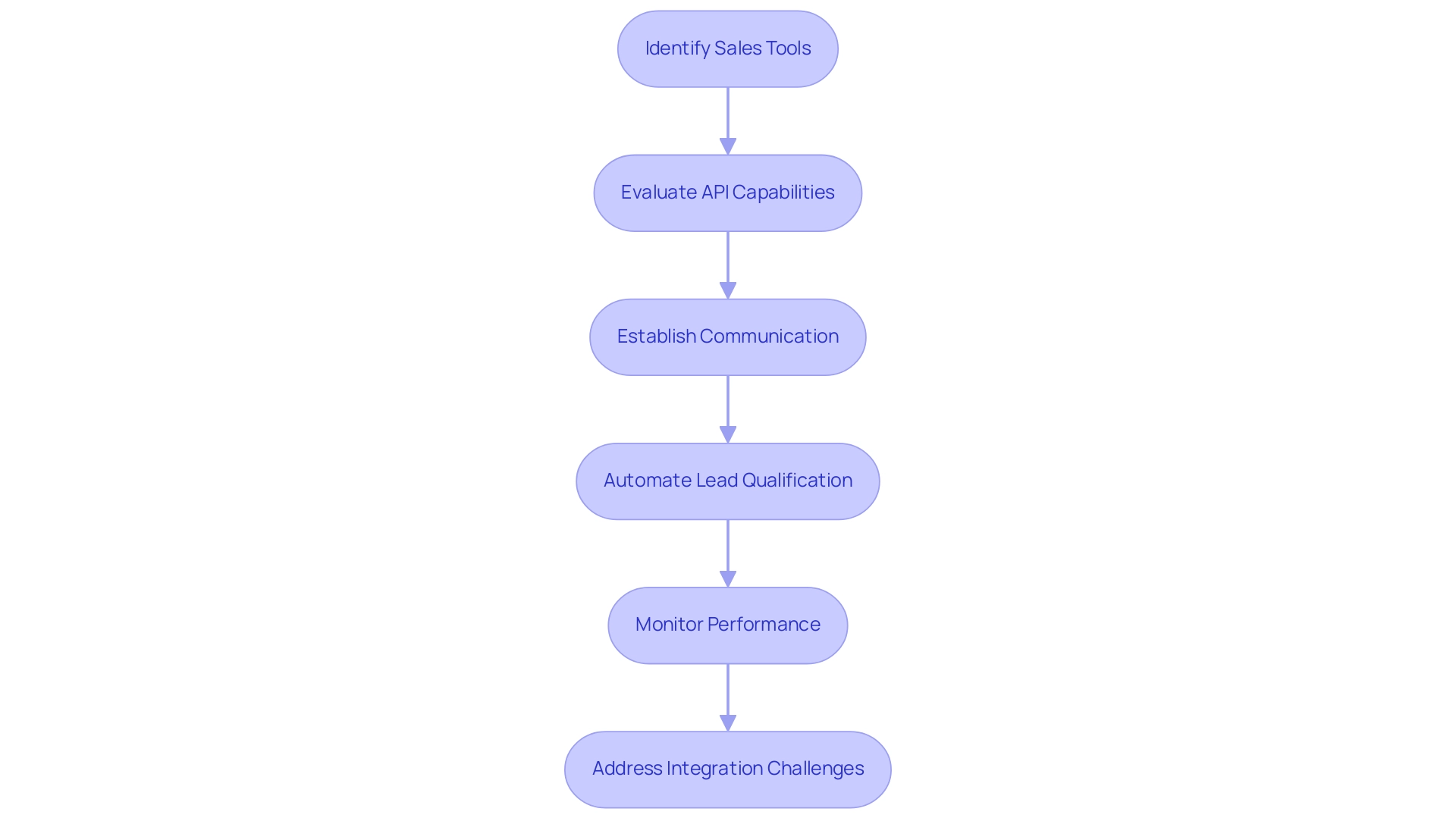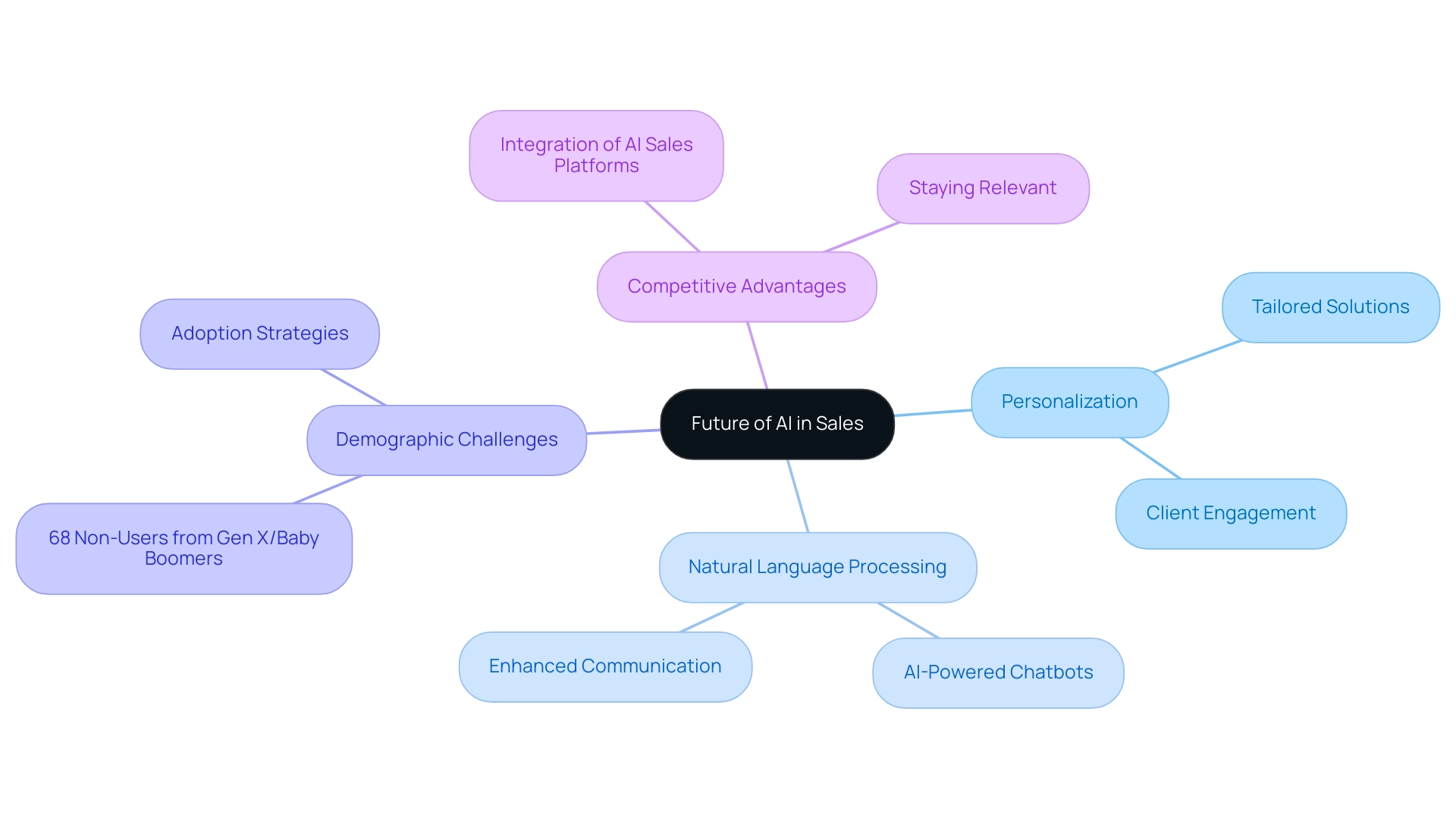What is an AI sales platform? Understanding its role in modern sales strategies

Introduction
In today’s business environment, incorporating artificial intelligence into sales tactics has become a significant evolution. AI sales platforms offer the potential to:
- Simplify processes
- Enhance lead generation efforts
- Increase efficiency by automating tasks
- Offer data-driven insights
With capabilities to forecast customer actions and tailor engagements, companies can not only improve sales outcomes but also uphold a crucial human touch in customer care. This piece discusses how AI is changing the sales landscape by looking at aspects such as:
- Features
- Integration methods
- Upcoming trends that will influence the field of sales in the future
As businesses adjust to these advancements, it’s essential to grasp the importance of finding a balance between automated processes and maintaining personal connections for prolonged success in the industry.
Defining AI sales platforms: A new era in sales strategies
AI sales platforms are game-changers in the selling process. They leverage artificial intelligence to make selling smarter and more efficient. Take Dashly, for example. It automates appointment scheduling and sorts prospects into high and low-quality categories. This isn’t just a minor improvement; it’s a significant boost in transaction efficiency.
Before Dashly, clients struggled with identifying key prospects, entering data into CRMs, and juggling appointments. These hurdles stifled growth and hurt sales performance. Dashly flips that script. It streamlines 60–70% of the sales process for non-Marketing Qualified Leads (non-MQLs), freeing up valuable time for sales teams. Plus, it manages 70–90% of appointments with MQL prospects automatically.
These AI sales platforms harness advanced tech — data analysis, automation, and machine learning — to supercharge lead generation. By integrating AI, teams can make smarter decisions backed by analytics, predict client behaviors, and deliver tailored interactions that enhance the customer experience.
Dashly doesn’t just keep pace; it leads the pack with an email open rate of 50–60%, well above the industry average. It also boasts a stunning 99% accuracy in predicting client outcomes. Yet, it’s important to note that 60% of marketing specialists worry about generative AI’s potential to harm a company’s reputation. This highlights the need for careful implementation. Still, 9 out of 10 service professionals using AI tools recognize their role in boosting customer service efficiency.
The widespread adoption of AI is evident — 4 billion voice assistants are in use globally. This underscores AI’s critical role in modern business strategies. The shift towards AI represents a major leap forward, enhancing efficiency and productivity while helping small businesses adapt to rapidly changing market dynamics.

Key features and benefits of AI sales platforms
AI sales platforms are game changers. They come loaded with features that can supercharge your operations. Take analytics, for example. It helps businesses forecast trends and understand customer behavior on a deeper level. Then there’s automation. Think of it as your tireless assistant, handling everything from organizing meetings to managing follow-ups. This means your sales teams can focus on what really matters — closing deals.
Reporting dashboards are another critical component. They provide insights into key performance metrics that can guide your strategies. If you want to enhance your business efforts, you need to know what’s working and what’s not. Companies that integrate AI sales platforms can expect improved operational efficiency, better conversion rates for leads, and increased customer engagement. In short, this can mean more revenue.
But let’s not gloss over the elephant in the room: the fear of AI replacing human jobs. The case study ‘Artificial Intelligence in Sales; Can AI Substitute Human Salespeople? ’ raises an important question about the future of sales roles as AI technology becomes more prevalent.
Here’s the kicker, though. While AI can boost efficiency, we can’t forget about client preferences. Research indicates that 90% of people prefer talking to a human rather than a chatbot for support. In a business landscape where companies like Salesforce are pushing generative AI, it’s clear that small businesses must embrace these technologies while also maintaining that personal touch with customers.
The global AI market is projected to hit $300 billion by 2024, with over 75% of businesses expected to adopt AI solutions, particularly in sectors like retail and healthcare. Integrating AI into your business strategy isn’t just a nice-to-have; it’s essential for success. Don’t get left behind.

Integrating AI sales platforms with existing sales tools
Integrating an AI sales platform with your sales tools isn’t just important — it’s essential for survival in a competitive market. Think of it like building a bridge between your sales processes and your Customer Relationship Management (CRM) software, email marketing tools, and other commerce systems. If these platforms can’t communicate, you’re setting yourself up for a traffic jam of data.
The key here is to prioritize systems that offer APIs and syncing capabilities. This is your lifeline for smooth data transfer. When everything talks to each other, you’re not just boosting the AI sales platform’s performance; you’re also empowering your teams to leverage existing data and workflows more effectively. Cem Dilmegani points out how Pipedrive uses AI to streamline sales processes, making them more efficient and effective.
Let’s take a look at Oracle Corporation’s Fusion Cloud Applications Suite. They recently integrated 50 generative AI functionalities to enhance customer interactions and improve overall user experience. That’s not just innovation; that’s setting a new standard. In 2023, North America led the charge in adopting AI technology in CRM systems, capturing a whopping 37% market share. This surge came from a genuine demand for transformation and cutting-edge solutions.
When companies use AI-driven CRM tools, they can automate lead qualification. This isn’t just about saving time; it’s about enhancing revenue efficiency by analyzing data from chatbots and email bots. By following best practices for AI integration, organizations can significantly boost their operational efficiency.
The transition to AI-driven revenue strategies should be seamless. But remember, obstacles will pop up during the integration phase. The key is to tackle them head-on. Embrace the challenges, and you’ll not only survive but thrive in this rapidly evolving landscape.

Enhancing sales team productivity with AI
In today’s fast-paced sales environment, an AI sales platform isn’t just a nice-to-have; it’s a game changer. It boosts the productivity of sales teams by automating mundane tasks and delivering insights that matter. Think of AI-driven scoring tools as your sales team’s GPS. They help reps navigate through high-value prospects, ensuring they focus their energy where it counts the most.
By analyzing customer interactions, AI spots patterns that inform strategic decisions. This allows teams to tailor their approaches based on solid data, not just gut feelings. The result? Salespeople can invest their time in building relationships and closing deals, leading to better performance and increased revenue.
Now, let’s face it: employee satisfaction is a big deal. A staggering 64% of industry experts are willing to jump ship for better pay. Many cite a lack of career growth and poor communication from management as significant pain points. This is a wake-up call for companies. If you want to keep your talent, you need to enhance productivity and job satisfaction.
Sellers are often weighed down by a laundry list of selling tasks, even as the demand for value delivery soars. Fortunately, the AI sales platform lightens that load. It allows sales teams to zero in on what they do best.
Research from Tech.COS shows a clear connection between AI adoption and productivity. A whopping 72% of companies that fully embrace AI report productivity gains, compared to just 55% of those with limited integration. This isn’t just about overcoming obstacles; it’s about elevating the entire employee experience. The bottom line is simple: integrating AI isn’t just smart — it’s essential for thriving in today’s market.

The future of AI in sales: Trends and predictions
The commerce sector is at a tipping point. Generative AI is set to shake things up in a big way. Most professionals in the field see a future where AI transforms personalization. Imagine sales teams being able to tailor their solutions to fit the unique preferences and behaviors of every single client. That’s not just a nice-to-have; it’s a game changer.
Let’s talk about natural language processing. This technology is about to turbocharge user engagement. AI-powered chatbots and digital assistants are coming in hot, making communication smoother and more efficient. There’s a study out there titled “AI in Commerce: Could AI Take Over Human Representatives?” that highlights an important point: AI isn’t just here to replace us. It’s a powerful tool that enhances human efforts. Instead of getting bogged down in mundane tasks, professionals can focus on what really matters — building relationships with clients.
Now, here’s a reality check. A whopping 68 percent of people not using AI are from the Gen X or Baby Boomer demographics. This is a demographic hurdle that businesses can’t ignore. If companies want to stay relevant, they need to factor this into their strategies for adopting AI technologies.
Looking ahead to 2024 and beyond, those who integrate AI sales platforms into their strategies will have a leg up on the competition. This isn’t just a trend; it’s a fundamental shift in how businesses engage with their customers. Embracing AI and machine learning is no longer optional — it’s essential to thrive in today’s fast-paced business landscape. If you want to stay ahead, you better get on board.

Conclusion
AI powered sales platforms are transforming the sales industry by simplifying operations and boosting lead generation while also automating tasks efficiently. These innovative solutions not only increase effectiveness but also offer valuable insights driven by data that help sales teams comprehend customer behavior and customize their engagements accordingly. Incorporating AI into sales structures is essential for optimizing efficiency and keeping up with the fast changing market requirements effectively.
The important aspects of these platforms include:
– Data analysis capabilities
– Automated processes
– Detailed reporting
These aspects greatly improve sales functions. To effectively leverage AI tools while preserving the valued connections with customers is crucial. The ongoing discussion on AI’s impact on sales stresses that although these technologies boost productivity, the human element is essential in nurturing customer bonds.
In the coming years, the direction of AI in sales will be shaped by the focus on personalization and enhanced communication techniques. Businesses that adopt these advancements will not only enhance their sales approaches but also secure a competitive edge in the market. The move towards AI isn’t merely a fad; it signifies a fundamental shift in how companies interact with their customers and adjust to the ever evolving landscape of the business world.
In summary, it is vital for contemporary businesses to effectively incorporate AI into their sales strategies. By grasping its capacities and recognizing the value of engagement, companies can leverage AI’s potential to boost expansion and attain long term prosperity in a highly competitive landscape.





![Growth Marketing, o que é? O guia definitivo [explicado por um hacker de crescimento]](https://www.dashly.io/blog/wp-content/uploads/2023/04/The-ultimate-guide-to-growth-marketing-explained-by-a-growth-hacker-720x317.png)

![4 steps as Chief Marketing Officer at a new company [Expert guide]](https://www.dashly.io/blog/wp-content/uploads/2022/10/4-steps-as-Chief-Marketing-Officer-at-a-new-company-Expert-guide-720x317.jpg)